THE STONE
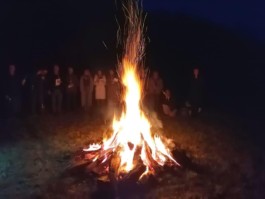
And by Easter morning
The sky was aflame
It looked flamboyant
Drenched by the night's ceremony
Drunk on the heat of the vigil fire
As if with the tablet of moon
It had swallowed its colours
Slowly the dark ground lit up
It became illuminated with pink
Then orange then gold
Branch by branch
Green blade by blade
Over the sill and into the room
Leaf patterns spilling onto the floor
She stood at the entrance
Staring into the dark tomb
A chasm that felt like her heart
Big stone rolled across
Nothing nothing
Drained of life and colour
An empty cup to hold her tears
There is a void in our heart
And it needs to remain a void
So God can grow in us
Old stories of safety must loosen
Their protection is too small
And through all that buried loss
Came his body no longer dead
'The human heart is like a night bird
Silently waiting for something
And when the time comes
It flies straight towards it'*
There he was calling 'Mary'
A sudden surge of life itself
Sprung from what had been torn
Do not be afraid
Do not forget me when I'm here
Her voice replied 'Rabboni'
Do not forget me when I'm there
Nothing nothing
And colour seeped into the garden
Circling her in its embrace
Death cloths blown on the wind
The stone finally rolling away
Making way for what is coming
Purple violet smelling flowers
Dappled like a royal robe
Grass under their feet
Shining and wet with dew
*Quote - Murakami - Colorless Tsukuru Tazaki
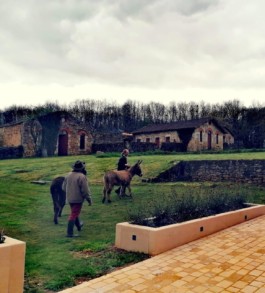
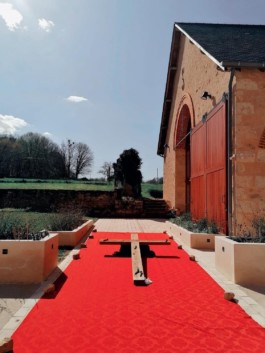
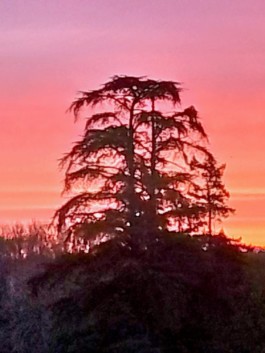
On some level, making sense of Easter at Bonnevaux has been like reading the maths symbols of a long equation, or opening a scroll, revealing a map of a place I am still finding my way towards. Perhaps part of me is already arrived, but it can feel like a part that appears through the deep body sensations left by a dream, or the sound of the nightingale that sang all night long in the garden where I was staying during my recent last few days in France.
Alongside the rhythm of meditation, ceremonies, fasting, feasting, the poetic language and drama of it all I was also listening to a curiously curated podcast titled 'The Revolution will not be Psychologized' - and these experiences dovetailed into deepening a thought stream I've had for a while, an intuition that is now possibly nudging me into its truth: that to really encounter something like this series of sacramentalised events, its narrative of human shadow and potential, intimacy and betrayal, death and resurrection, we need more than a psychological or archetypal understanding of them.
And I think this goes for many things right now, the realities we face. The need to grow beyond archetypal energies is perhaps the embodiment and eco revolution that calls us out of our primal fears, into expression and relationship that surrender into service of a far greater good. The symbols of archetype work as signposts. However, it seems when we get stuck there, reading our experiences through their codes, we risk a kind of madness, thinking we are the thing, rather than participators in being known by what is greater than our ego eye, the slow recognition of our truer self.
Is this God? The mind of the cosmos? Expressed here in this icon of the Christ? The podcast doesn't say these words, but it comes through like gradual illuminations in the characters of these Easter stories, the stories that have been made and pored over as sacred text, and points to a presence where we're brought to ask, what if this unfolding has nothing (or at least much less) to do with my personal process, but has far wider implications as to where we're headed? The revolution will not be psychologized
We are used to framing our experiences on the feeling. emotional maps of Western psychology, so we are almost blinded to it's power. Perhaps what I slowly realise is that Easter includes this but in many ways has hardly anything to do with that. As if there's a slow dawning that it's not just a story or symbol for something, but it is the thing itself, as in reality is changed when we decide to enter its 'gnosis' - a word used in a quote I share below by Cynthia Bourgeault in her book about Mary Magdalene (the person who first sees and is in the presence of the resurrected body of Jesus). She says that the decisions of the religious establishment to divide 'the gospels' from the texts of 'gnosticism' is a false divide that just sucks us back into a superficial and psychological reading of the unfolding of these events. The gnosis she speaks about is like putting on a different set of eyes.
It's also been the case that these narratives have activated a kind of shock response for me, as if they bounce against some hard-drive that won't quite let them in. Perhaps this is a trust issue, because of being hurt by organisations and the people who get blinded by their hierarchies and structures. Because the stream of consciousness they've been passed through tends to focus on what the quote refers to as 'states', rather than the slower, more fluid and more integrated nuance of 'stages'.
But what I feel is at the heart of it is a choice, somewhere along the road, to do with will. The innate freedom we all have to give attention, which in mystic language is the same as love. When a daily prayer (as at Bonnevaux) repeats the words 'thy will be done' and the request for forgiveness 'as we forgive', it starts to drop into the psyche like dew, starts to soften the wall built up by the defences of the ego. Our will is fundamentally shaped by our wounding and our culture. And I think the damaging fall-out of this is what Easter seeks to heal, guiding us beyond the map into the landscape itself.
' "For now I see through a glass darkly, but later face to face; nor I know in part, but later I will know even also as I am known"... the essential thing to keep in mind about this knowing is that it's participational. It is not just a knowing from the head; it's a knowing with the entire being. The Hebrew term from which it translates is da'ath, which is also the word used for "love-making"... Gnosis speaks of a complete, integral knowing uniting body, mind, and heart - and by its very largeness connecting the seen and the unseen.
'... This "knowing" is not initiatic wisdom. It is not about Mystery rituals or secret initiation ceremonies where esoteric information is imparted. The difference (is) summed up by Ken Wilber between "states" and "stages". Initiatic rituals can briefly change people's states, transporting them into ecstatic visions and cosmic consciousness.
But gnosis is about stages; it is integral knowledge brought about by the slow unification of one's being... it is not only an altered state of mind (moving from narrow to spacious), but an altered state of behaviour, moving from selfishness, fear, and narcissism to justice, compassion, and humility. Jesus taught gnosis and was a master of gnosis... But he did not change anyone's states, either by secret rituals or esoteric information. Rather, he set his disciples upon the only known path to integral transformation: the slow and persistent overcoming of the ego through a lifelong practice of surrender and nonattachment. [This] gnosis is gradual, conscious, and sober.”
Cynthia Bourgeault,
The Meaning of Mary Magdalene
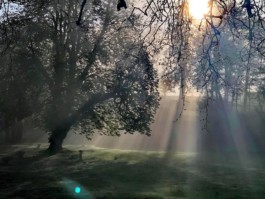
Copyright © 2020 Rebecca Brewin, all rights reserved. rebecca@handtoearth.net +44 (0) 789 693 6625 Return to top